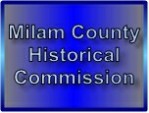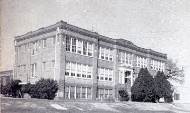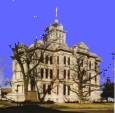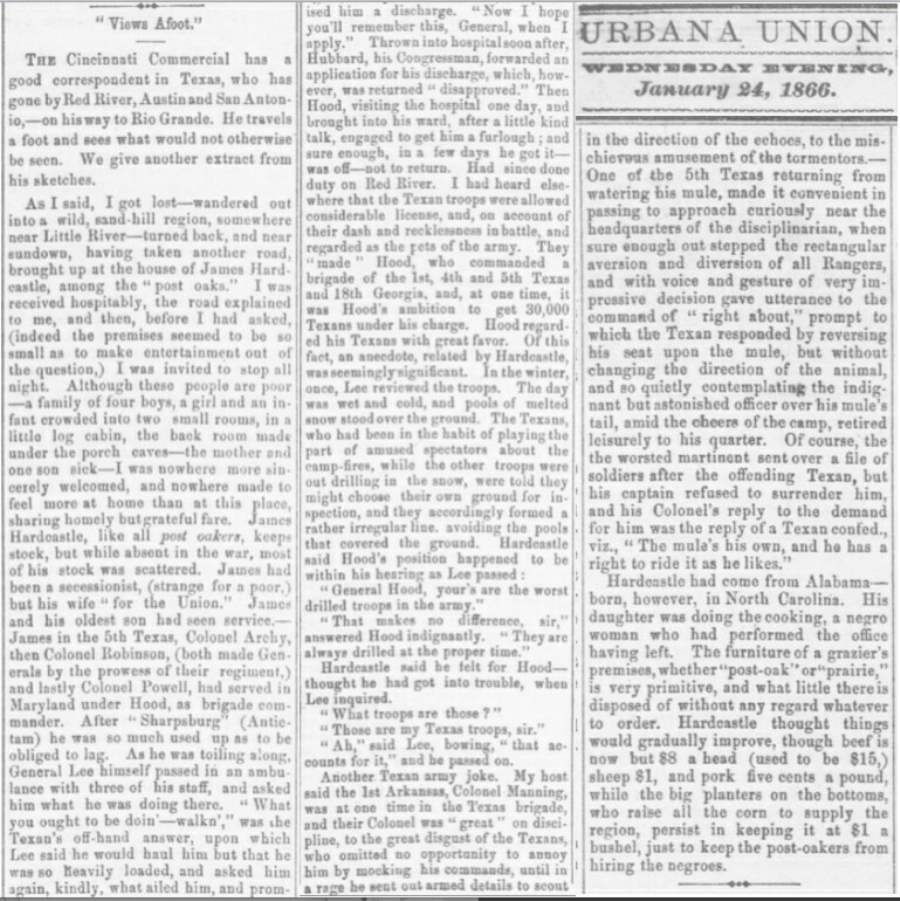Email rec'd 2015-12-08
Kelly Kerr
the4kerrs(AT)gmail(DOT)com
League City, TX
Hello, I found a wonderful newspaper article on my ancestor Eli Hardcastle's brother James Hardcastle. It was
about post-oakers in the Confederacy and it is a personal interview of James Hardcastle in 1866.
A newspaper journalist from Ohio just happened to stop by his house and James invited him to spend the night.
James gives him great insight into a Post-Oakers from Little River, TX as well as personal anecdotes about his
time in the war under Hood's Brigade.
It's definitely something that anyone can appreciate from Milam county. How can I send this to you?
You also have an article about Elias Hardcastle and his memoirs. Elias was James' nephew.
Kelly Kerr
*****
Transcribed by Kelly Kerr
"Views Afoot."
Urbana Union
Cincinnati Commercial
January 24, 1866
The Cincinnati Commercial has a good correspondent in Texas, who has gone by Red River,
Austin and San Antonio, on his way to Rio Grande. He travels a foot and sees what would
not otherwise be seen. We give another extract from his sketches.
As I said, I got lost wandered out into a wild, sand-hill region, somewhere near Little
River turned back, and near sundown, having taken another road, brought up at the house
of James Hardcastle, among the "post oaks." I was received hospitably, the road
explained to me, and then, before I had asked, (indeed the premises seemed to be so
small as to make entertainment out of the question), I was invited to stop all night.
Although these people are poor a family of four boys, a girl and an infant crowded into
two small rooms, in a little log cabin, the back room made under the porch caves the
mother and one son sick I was nowhere more sincerely welcomed, and nowhere made to feel
more at home than at this place, sharing homely but grateful Fare.
James Hardcastle, like all post oakers, keeps stock, but while absent in the war, most
of his stock was scattered. James had been a secessionist, (strange for a poor) but his
wife "for the Union." James and his oldest son had seen service. James in the 5th Texas,
Colonel Archy, then Colonel Robinson, (both made Generals by the prowess of their
regiment,) and lastly Colonel Powell, had served in Maryland under Hood, as brigade
commander. After "Sharpsburg" (Antictam) he was so much used up as to be obliged to lag.
As he was toiling along, General Lee himself passed in an ambulance with three of his
staff, and asked him what he was doing there. "What you ought to be doin': walkn'," was
the Texan's off-hand answer, upon which Lee said he would haul him but that he was so
Heavily loaded, and asked him again, kindly, what ailed him, and promised him a
discharge. "Now I hope you'll remember this, General, when I apply."
Thrown into hospital soon after, Hubbard, his Congressman, forwarded an application for
his discharge, which, however, was returned "disapproved." Then Hood, visiting the
hospital one day, and brought into his ward, after a little kind talk, engaged to get
him a furlough; and sure enough, in a few days he got it was off not to return. Had
since done duty on Red River.
I had heard elsewhere that the Texan troops were allowed considerable license, and, on
account of their dash and recklessness in battle, and regarded as the pets of the army.
They "made" Hood, who commanded a brigade of the 1st, 4th and 5th Texas and 18th
Georgia, and, at one time, it was Hood's ambition to get 30,000 Texans under his charge.
Hood regarded his Texans with great favor. Of this fact, an anecdote, related by
Hardcastle, was seemingly significant. In the winter, once, Lee reviewed the troops. The
day was wet and cold, and pools of melted snow stood over the ground. The Texans, who
had been in the habit of playing the part of amused spectators about the camp-fires,
while the other troops were out drilling in the snow, were told they might choose their
own ground for inspection, and they accordingly formed a rather irregular line, avoiding
the pools that covered the ground. Hardcastle said Hood's position happened to be within
his hearing as Lee passed:
"General Hood, your's are the worst drilled troops in the army." "That makes no
difference, sir," answered Hood indignantly. "They are always drilled at the proper
time."
Hardcastle said he felt for Hood thought he had got into trouble, when Lee inquired.
"What troops are those?" "Those are my Texas troops, sir." "Ah," said Lee, bowing, "that
accounts for it," and he passed on.
Another Texan army joke. My host, said the 1st Arkansas, Colonel Manning, was at one
time in the Texas brigade, and their Colonel was "great" on discipline, to the great
disgust of the Texans, who omitted no opportunity to annoy him by mocking his commands,
until in a rage he sent out armed details to scout in the direction of the echoes, to
the mischievous amusement of the tormentors.
One of the 5th Texas returning from watering his mule, made it convenient in passing to
approach curiously near the headquarters of the disciplinarian, when sure enough out
stepped the rectangular aversion and diversion of all Rangers, and with voice and
gesture of very impressive decision gave utterance to the command of "right about,"
prompt to which the Texan responded by reversing his seat upon the mule, but without
changing the direction of the animal, and so quietly contemplating the indignant but
astonished officer over his mule's tail, amid the cheers of the camp, retired leisurely
to his quarter. Of course, then the worsted martinent sent over a file of soldiers after
the offending Texan, but his captain refused to surrender him, and his Colonel's reply
to the demand for him was the reply of a Texan confed., viz., "The mule's his own, and
he has a right to ride it as he likes."
Hardcastle had come from Alabama - born, however, in North Carolina. His daughter was
doing the cooking, a negro woman who had performed the office having left. The furniture
of a grazier's premises, whether "post-oak" or "prairie," is very primitive, and what
little there is disposed of without any regard whatever to order. Hardcastle thought
things would gradually improve, though beef is now but $8 a head (used to be $15,) sheep
$1, and pork five cents a pound, while the big planters on the bottoms, who raise all
the corn to supply the region, persist in keeping it at $1 a bushel, just to keep the
post-oakers from hiring the negroes.
*****
2016-11-17 NOTE:
Hi Jerry,
I wanted to thank-you for the post on the website. It looks great.
I wanted to add a note to the Elias Hardcastle article if possible. The article states
that Elias and Elijah Hardcastle were implicated in a murder. Just a note about Elijah,
Elias’ brother. Elijah was born in 1868. Elias was implicated in 1874. That would make
Elijah only 8 years old. Elias was 32 years old. Elijah, being an extremely young minor,
would not have made the news today with privacy laws about minors. Might want to note
that on the article or remove it. Elijah was never mentioned in the papers after that.
Elijah’s grandchildren are still living.
Kelly
.





Milam County Historical Commission
Milam County, Texas
Milam County, Texas

.

Thanks to Kelly Kerr, League City, TX for the transcription and copy of the newspaper article.
See also "The Life and Times of Elias Hardcastle"
See also "The Life and Times of Elias Hardcastle"
.